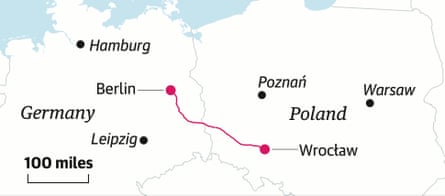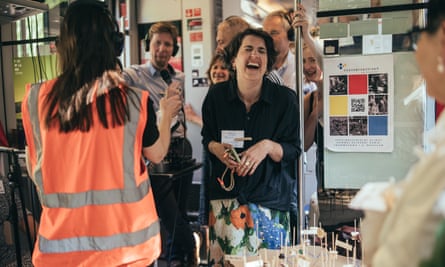Madame Ziemowit the witch nods and scratches her beard as I flip a tarot card, revealing the chariot symbol. Picking the chariot seems fitting, as the turban-clad sorcerer and I are on a train, having just crossed the border from Germany into Poland. Multicoloured lightbulbs adorn carriage windows, framing a green-blue blur of fields and rivers. Next to us a toddler, sitting in a mini-library by the loo, draws squiggles on an Etch A Sketch. A jaunty brass fanfare plays through the carriage speakers.
This is the Culture Train, which makes the four-and-a-half-hour journey between Berlin and the Polish city of Wrocław each weekend, and is surely one of the most creative and quirky railway services in Europe. Musicians, authors, DJs, teachers – and indeed performance artists adopting tarot card-reading witch personas – provide entertainment to passengers, who range from bum bag-strapped weekend trippers to Berghain clubbers on comedowns.

The idea, says project manager Oliver Spatz, is “a mix between a festival and an educational centre”. There is deeper meaning to the train than the flashing lights and music might suggest, however, with programming designed to strengthen cultural ties between Germany and Poland, challenge stereotypes, and bring art to a captive audience.
I arrive at the German capital’s Ostkreuz train station after getting the Eurostar from London to Brussels then the European Sleeper to Berlin. With the Culture Train leaving Ostkreuz at 8.05am on Saturdays, I spend Friday night at the Motel One Berlin-Hackescher Markt, overlooking Alexanderplatz station, four S-Bahn stops from Ostkreuz. You can leave the hotel at 7.30am and catch the Culture Train with minutes to spare.
Berlin-based Polish artist Jemek Jemowit, chosen for the Culture Train partly because of his connections to both Poland and Germany, sets up his tarot table soon after we depart. He dons his turban to become Madame Ziemowit and quickly has passengers lining up for free sessions. Natalia, a grinning German-Polish train announcer in her early 20s, declares on loudspeaker that Jemowit doesn’t actually believe in mystic tarot power. The real aim here is performance and social lubrication.

“We want to have this ‘clash’: more regular people meeting more art and culture,” says Jemowit, who runs a swimming pool-based art space in Berlin called Tropez. “Taking cultural stuff and art from the galleries and out to the people.”
The passengers’ Saturday morning yawns soon give way to discussions about tarot results. Emilia, a Berlin-based Polish woman travelling to Wrocław with her young daughter to visit family, tells me that the entertainment on board makes the journey pleasant rather than taxing. There are boxes of children’s books and games, plus wool and knitting needles anyone can get clacking with. Announcers host a quiz with questions about German and Polish culture.

Emilia, who is married to a German, rides the Culture Train regularly and says it’s a symbol of friendship. “The first thing I found out when I moved to Germany was that some people had the feeling that Poles were cheaters,” she says. “It’s not true. So, people who go to Poland can change their mind about this.”
The Culture Train started in 2016 as a way of getting more Berliners to visit Wrocław: the city (population close to 650,000) was that year’s European capital of culture. It was supposed to run for six months but proved so popular it has continued since, aside from an enforced Covid break. Funded by the German city-state Berlin and Brandenburg state, the train is run by Kulturprojekte Berlin, which was a culture-focused NGO when the train launched and is now owned by Berlin city-state.
Spatz has invited jugglers, dance instructors and bands to perform on the train, which at peak times can carry 1,000 people in six carriages, with the main performances usually in the front carriage. The most energetic show, he says, was from a 20-piece band with children’s instruments and ukuleles. “They were lying in the luggage racks while they played – they rocked the train.”
Culture Train performances are in German and/or Polish, in line with the train promoting culture in both countries. However, performers can often speak English, and one popular booking was a Yiddish language teacher who gave lessons on the train.

“We’ve been thinking about common heritage,” says Spatz, “and one thing linking German and Poland is the Jewish community. So, we thought about how we could help keep this heritage alive.”
Spatz says that in 2022 passenger numbers dipped because Germans didn’t want to travel eastwards. Many saw Poland as a “frontier” following Russia’s invasion of Ukraine, he says. So, shortly after the invasion, the Culture Train was used to send supplies to Ukrainian refugees in Poland. “It was hard to unload because the entire platform was full of refugees,” says Spatz. “So we took the refugees back to Germany.” He sent the train back for further missions. “People said we took 6,000 people in total, but I think it was more.”
We arrive in Wrocław at lunchtime on Saturday and check in to Hotel Europejski, opposite the dark yellow mansion-like Wrocław Główny train station. By early Sunday evening I’m back on the train for the return journey. Announcer Natalia hands paper to each passenger and asks them to write a letter about their Wrocław discoveries: it will be given to a passenger on the next trip.

I write about how Madame Ziemowit’s prediction – that I would find wonderful pierogi at Pierogarnia Ze Smakiem, a tiny restaurant where dumplings are folded in front of you – came true. And that opposite was the Polish Poster Gallery, where I bought an unofficial Blade Runner poster by Polish artist Michał Książek and chatted with owner Krzysztof about vintage poster art. I also write about leaving the immaculate touristy old town to find the Ruska 46 complex, where roads are swept less often and weird octopod street art adorns apartment blocks. There I found BMA Wrocław – a gallery showing excellent BDSM-inspired works depicting shoe licking and gorilla hugging.
I get to praise the BDSM exhibition live to the Culture Train passengers, as a “special British guest” on the radio station set up for the ride to Berlin. Thomas Müller and Frank Diersch, DJs from Radio Industry, a small radio show based in Woltersdorf, near the German capital, plug in mixers and mics around carriage seats. Wireless headphones are circulated before the show begins with Kraftwerk’s Trans-Europe Express. Passengers swig beer and dance in the aisle. I talk to Thomas and Frank about how expensive UK train tickets are, then have them play Super Furry Animals.
Partly thanks to Radio Industry’s excellent stock of electronic music, four and a half hours on the train once again zip by. As we arrive in Berlin, Spatz tells me that with close to 100,000 passenger journeys made on the Culture Train since 2016, he will pilot new routes in October.
“How about a Culture Train to London?” Spatz asks, semi-joking. I have a brief vision of long British train rides soundtracked by cellos, friendly chat and tarot cards gently slapping against tabletops, rather than TikTok played at maddening volume. One day perhaps.
The Culture Train is €24.90 one-way (dbregio-shop.de, then email kulturzug@kulturprojekte.berlin to reserve a seat in the entertainment carriage). London to Brussels provided by Eurostar (from £78). Brussels to Berlin provided by European Sleeper (return couchette from €158). Accommodation in Berlin provided by Motel One Berlin-Hackescher Markt (doubles from €89 room-only), and Wrocław by Hotel Europejski (doubles from £50 room-only – use code “Culturetrain” at Europejskiwroclaw.pl for a 15% discount)
 Top Naija News: Nigerian News, Breaking News Nigeria and World News Top Naija News is a daily news publication in Nigeria, delivering the latest breaking news in Nigeria and around the world.
Top Naija News: Nigerian News, Breaking News Nigeria and World News Top Naija News is a daily news publication in Nigeria, delivering the latest breaking news in Nigeria and around the world.



